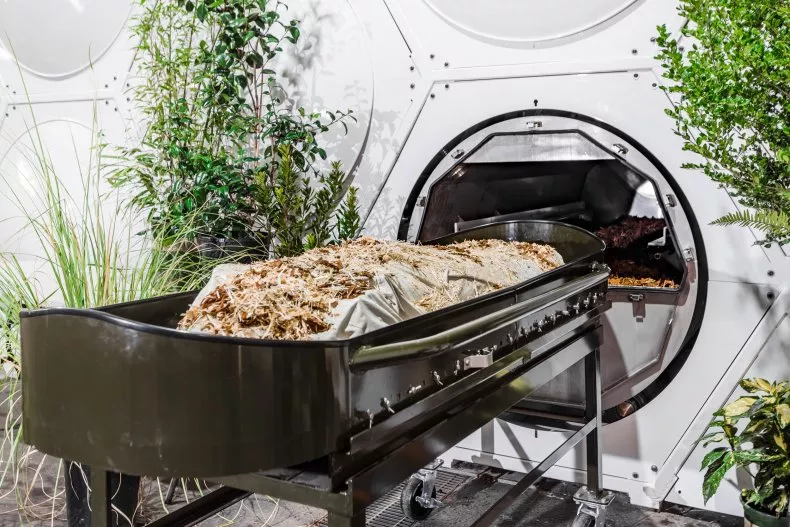Human composting will shortly become available as an end-of-life burial alternative in California. Gov. Gavin Newsom signed a bill into law on Sunday that establishes a state regulatory system for "natural organic reduction," or the transformation of human remains into the soil. The bill will go into effect in 2027.
"Your ultimate deed is one of pollution," Earth Funeral co-founder and CEO Tom Harries tells Newsweek. "Each year, more steel is buried than was used to construct the Golden Gate Bridge, and each cremation emits the equal of a 600-mile automobile trip in terms of carbon dioxide," Harries added.
According to the Centers for Disease Control and Prevention statistics, more than 3.3 million people die in America each year (CDC). "We can't just keep burying bodies," Harries remarked.
California has become the fifth state to permit human composting, following Oregon, Washington, Colorado, and Vermont. Supporters suggest that the approach is more environmentally friendly than coffin funerals or cremation, and analysts note that despite the unique burial method, it is not different from many cultures' historic customs of returning a person to the surface.
Burying Human with Nature in Nature
New burial strategies are being created as a result of contemporary technological advancements. One can now be grown into a tree in a biodegradable burial pod or decomposed by a sustained water flow in an aqua cremation. Conversely, one can be buried in a "mushroom death suit," which would be possibly the most ecologically sound option of all.
Recompose costs $7000 for human decomposition, also known as soil transformation, which employs a breakdown process to lock carbon into the soil.
This process commences when one person is enclosed in a sealed receptacle with a suitable platform for developing soil-forming bacteria. These then slowly decompose the body for more than 30 to 45 days, producing nutrient-rich soil that can be distributed by the family or used in conservation efforts. "It's just nature speeding up," Harries explained.

An image of a Recompose vessel with a dummy figure. Soil transformation can save one ton of carbon per person.
ALSO READ: Human Composting Facility Turns A Person's Remains Into Soil: Here's How they Do It
American's Environmental-Friendly Burial Shift
Based on the National Funeral Directors Association, increasingly, individuals are ditching traditional burial customs. Crematory has overtaken casket interment as the most common alternative for final determination: it was performed in 57.5% of burials in 2021, in contrast to a burial rate of 36.6%, as reported by the association.
In the organization's 2022 study, more than 60% of Americans would be interested in looking into "green" funeral arrangements due to potential environmental friendliness, cost savings, or other reasons-a 5% rise from 2021. Furthermore, more than half of those polled claimed they had seen a funeral in an unusual locale.
As David Heckel, who works at the Natural Funeral in Colorado and helps families prepare for end-of-life arrangements, most people lead human composting for environmental sustainability.
Since composting began permitted in Colorado a year ago, the funeral home has launched over 30 composting procedures. Heckel said he'd shown an increase in the number of people interested in the concept.
Nevertheless, there's been some pushback against this practice, primarily from the Catholic Church. "A process in which remains are composted and scattered... fails to adequately honor the respect due to the deceased," the New York State Catholic Conference said in an assertion.
Human composting is being addressed in New York and Massachusetts, and proposed bills have been initiated in Illinois and Minnesota.
RELATED ARTICLE: Human Composting Could Be a Thing in Washington State
Check out more news and information on Human Compost in Science Times.




![Earth's Quasi-Moon Kamo‘oalewa Could Originate From Lunar Surface Not Asteroid Belt [Study]](https://1721181113.rsc.cdn77.org/data/thumbs/full/53275/89/56/50/40/earths-quasi-moon-kamo-oalewa-could-originate-from-lunar-surface-not-asteroid-belt-study.png)









